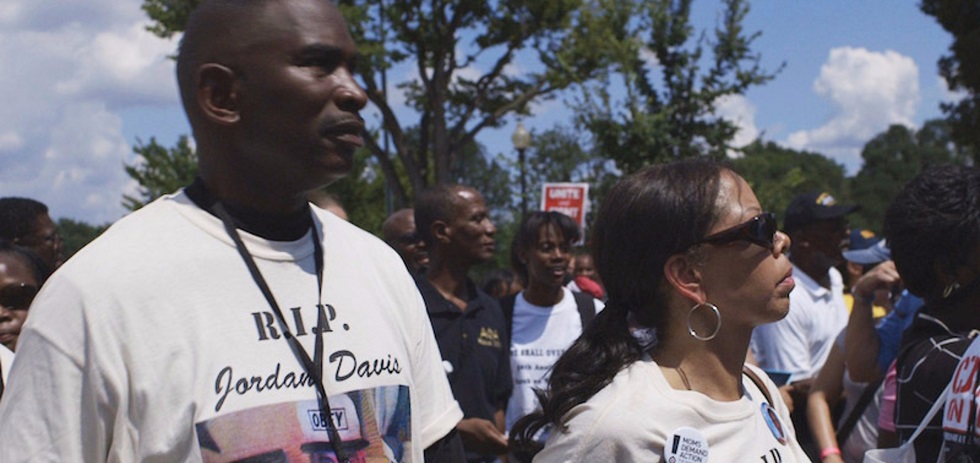Tracking the courtroom action of the first major stand your ground case to reach the courts after the Zimmerman trial, 3 ½ Minutes, Ten Bullets is, unfortunately, a poorly constructed exploration of extremely important events. While it is surely an important and prescient issue, the project’s failures as a film cannot be overlooked; what should be a punchy takedown of stand your ground laws in Florida and ongoing issues of racism across America is instead a scattered, inconsistent, and timid recount of judicial process, constantly hinting at far more interesting and important concepts without ever managing to push its agenda effectively.
Director Marc Silver’s 3 ½ Minutes, Ten Bullets intercuts talking heads interviews with extensive courtroom sequences and candid footage of the friends and family of Jordan Davis, a teenager who was shot multiple times by Michael Dunn for talking back to him in 2012, in an attempt to paint an image of America in a post-Zimmerman climate. In an upper-class area of Florida in the evening of Black Friday, 2012 Jordan got into a verbal tiff with Dunn after he told him to turn down his “thug music” at a gas station. Dunn claimed that Jordan had threatened him with a weapon and that he was acting in self-defense, claims that are shown time and time again to be completely baseless, making for what should have been (in any logical world) an open and shut case – however, as the documentary shows proficiently, the American judicial system clearly operates outside the realm of logic and reason. While Silver is skilled in his recounting of the judicial side of the story, he fails to clearly establish the point of his documentary, never demonstrating how ludicrous Florida’s stand your ground laws are or drawing correlations to demonstrate that they disproportionately disadvantage people of African-American descent. These are pressing issues that need to be addressed further in the current US socio-political climate. Unfortunately, Silver seems more concerned with tracking judicial process than extracting any points from the case, leaving it to the minds of his audience to make his documentary effective.1 Ultimately, Silver fails to effectively establish the human element of his film, and never overtly takes the underbelly of racism permeating contemporary America to task, with 3 ½ Minutes, Ten Bullets coming across as a muddled mess.
It should have been easy to achieve such an end too – in fact, Silver sets up all the building blocks, he just fails to construct anything out of them. Michael Dunn comes across as a modern-day clansman, but not by any doing on Silver’s behalf; it’s left to a courtroom speech by the state prosecutor to push such an analogy into the viewer’s mind. He posits the notion that it is a case based around a man feeling disrespected, rather than one in which he legitimately feared for his safety in a magnificent opening speech. An argument could be made that Silver is pushing the same agenda through his choice to include this speech in 3 ½ Minutes, Ten Bullets and such an argument would be fair – however it does not excuse how poorly and lazily he goes about constructing it within this documentary, especially considering that such a point of view is not difficult or world shattering, in fact, it seems common sense.
It’s a shame that 3 ½ Minutes, Ten Bullets isn’t a lot stronger, especially considering how fascinating the case it centres around is. Even more disappointing is that the film comes to Australia having won the US Documentary Special Jury Award for Social Impact at Sundance – having been hyped on the festival circuit, it’s another disappointing reminder that people are willing to forgive fundamentally bad filmmaking if the issue is important enough.2 Unfortunately, in a world where digital cinema technology is cheap, and documentaries can be conceived and shot on a shoestring budget, it’s not enough to simply recount events. This probably isn’t the first stand your ground documentary and it certainly won’t be the last, nor will it be the strongest. One thing that is for certain is 3 ½ Minutes, Ten Bullets will not be remembered as a film with strength in the way it tackles issues surrounding race in contemporary America – two other tangentially related festival entries, Welcome to Leith and Tales of the Grim Sleeper, are already far more proficient than this at that. None of this is to say that we should forget or overlook the tragic tale of Jordan Davis, the opposite in fact. Jordan Davis deserves much better than this, other directors would have done much better with this, and hopefully someone makes something about his story that is far, far better than this.

